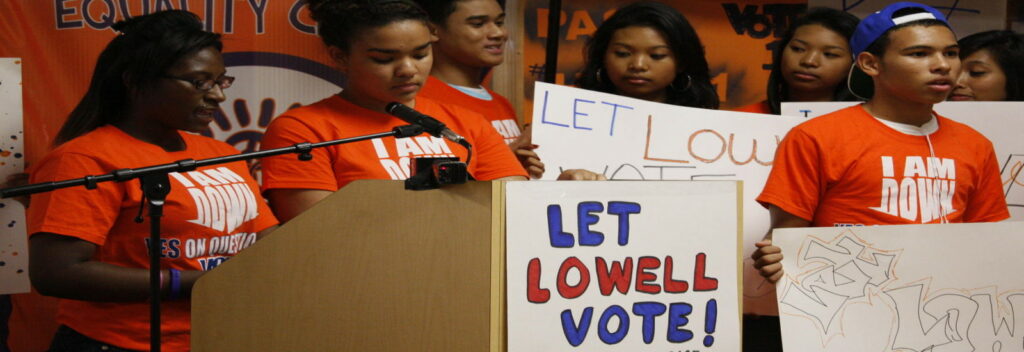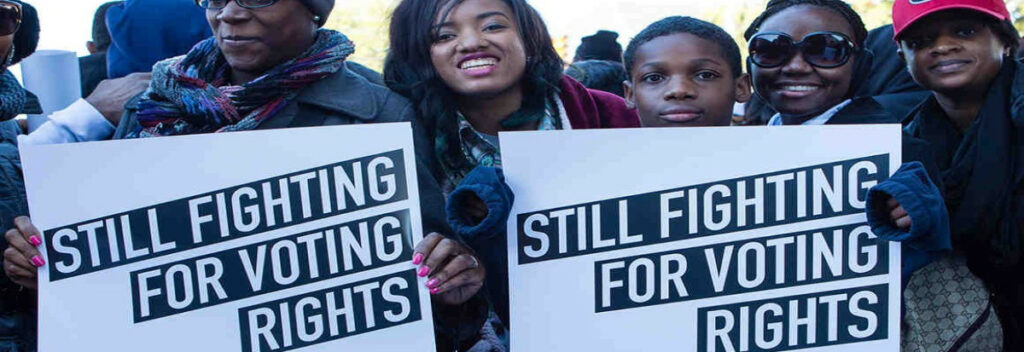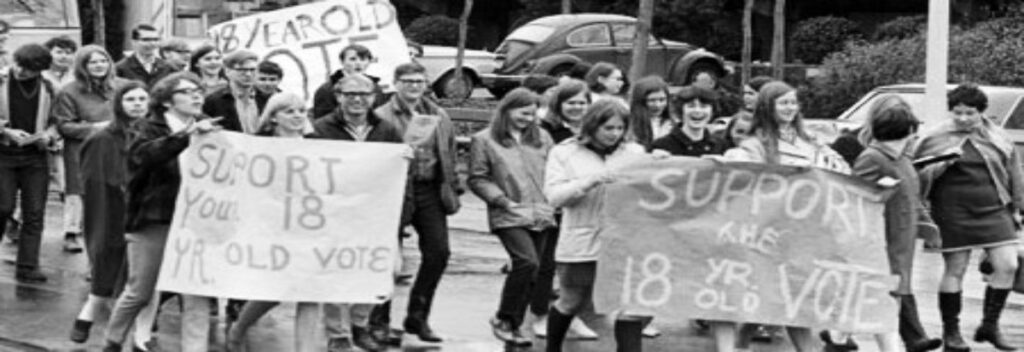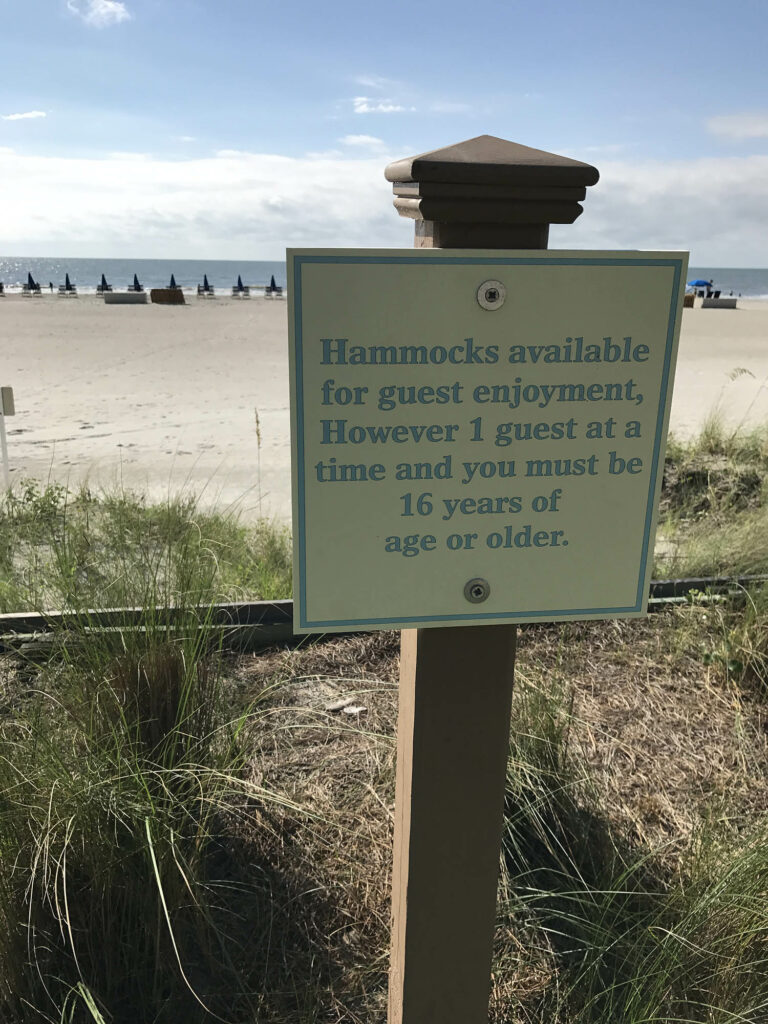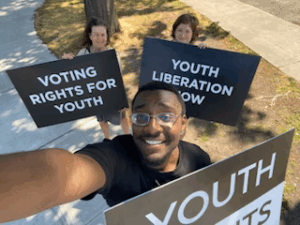The age of candidacy is the minimum age required for someone to hold a political office, such as Senator or Governor. These laws are set in the Constitution for federal offices and in each state’s legal code for state offices, which means that they can vary widely from state to state.
Federal Offices
Age requirements for federal office were set over two-hundred years ago, when the writers of the U.S. Constitution decided that candidates needed to be twenty-five years old in order to serve in House of Representatives, thirty to serve in Senate, and thirty-five to run for President. At the time, however, there was debate about whether there should be age restrictions at all. One author, James Wilson, argued that age restrictions would “damp the efforts of genius, and of laudable ambition, [and that] “there was no more reason for incapacitating youth than age.” Despite twelve of the delegates being under 35 (including four that were in their 20s), age discrimination was written into the U.S. Constitution.
Age of candidacy laws unfairly bar from office young people with a strong background in politics and capable of gaining the support of their constituents. When Senator Rush Holt was elected to the Senate at age twenty-nine in 1934, he was not able to be sworn in until six months after the election due to his age. Although Sen. Holt went on to serve in Congress, many young people don’t even have the opportunity to run because in many areas, only eligible candidates are allowed on the ballot. Of course, the few that can run for office within their states are held back by stigmas associated with younger people in general.
State Offices
Since each state sets its own qualifications for state office, the ages of candidacy depend on the state as well as on the type of office. Here’s a rundown:
| State | Governor | Upper House | Lower House | Lieutenant Governor | Attorney General | Secretary of State | Treasurer |
|---|---|---|---|---|---|---|---|
| Alabama | 30 | 25 | 21 | 30 | 25 | 25 | 25 |
| Alaska | 30 | 25 | 21 | 30 | 18 | – | 18 |
| Arizona | 25 | 25 | 25 | – | 25 | 25 | 25 |
| Arkansas | 30 | 25 | 21 | 30 | 18 | 18 | 18 |
| California | 18 | 18 | 18 | 18 | 18 | 18 | 18 |
| Colorado | 30 | 25 | 25 | 30 | 25 | 25 | 25 |
| Connecticut | 30 | 18 | 18 | 30 | 18 | None | 18 |
| Delaware | 30 | 27 | 24 | 30 | None | None | None |
| Florida | 30 | 21 | 21 | 30 | 30 | None | 25 |
| Georgia | 30 | 25 | 21 | 30 | 25 | 25 | 18 |
| Hawaii | 30 | 25 | 18 | 30 | None | – | None |
| Idaho | 30 | 18 | 18 | 30 | 30 | 25 | 25 |
| Illinois | 25 | 21 | 21 | 25 | 25 | 25 | 25 |
| Indiana | 30 | 25 | 21 | 30 | None | 18 | None |
| Iowa | 30 | 25 | 21 | 30 | 18 | 18 | None |
| Kansas | None | 18 | 18 | None | None | None | None |
| Kentucky | 30 | 30 | 24 | 30 | 30 | 30 | 30 |
| Louisiana | 25 | 30 | 18 | 25 | 25 | 25 | 25 |
| Maine | 30 | 25 | 21 | – | None | None | None |
| Maryland | 30 | 25 | 21 | 30 | 18 | 18 | None |
| Massachusetts | 18 | 18 | 18 | 18 | 18 | 18 | 18 |
| Michigan | 30 | 21 | 21 | 30 | None | 18 | None |
| Minnesota | 25 | 21 | 21 | 25 | 21 | 21 | None |
| Mississippi | 30 | 25 | 21 | 30 | 26 | 25 | 25 |
| Missouri | 30 | 30 | 24 | 30 | None | None | None |
| Montana | 30 | None | None | 25 | 25 | 25 | None |
| Nebraska | 30 | 21 | – | 30 | None | None | None |
| Nevada | 25 | 21 | 21 | 25 | 18 | 18 | 18 |
| New Hampshire | 30 | 30 | 18 | – | 18 | 18 | None |
| New Jersey | 30 | 30 | 21 | 30 | None | None | None |
| New Mexico | 30 | 25 | 21 | 30 | 30 | 30 | 30 |
| New York | 30 | 18 | 18 | 30 | 30 | None | 30 |
| North Carolina | 30 | 25 | 21 | 30 | None | 21 | 21 |
| North Dakota | 30 | 18 | 18 | 30 | 25 | 25 | 25 |
| Ohio | 18 | 18 | 18 | None | 18 | 18 | 18 |
| Oklahoma | 31 | 25 | 21 | 31 | 31 | 31 | 31 |
| Oregon | 30 | 21 | 21 | – | 18 | 18 | None |
| Pennsylvania | 30 | 25 | 21 | 30 | 30 | None | None |
| Rhode Island | 18 | 18 | 18 | 18 | 18 | 18 | 18 |
| South Carolina | 30 | 25 | 21 | 30 | 18 | 18 | None |
| South Dakota | 21 | 21 | 21 | 21 | None | None | None |
| Tennessee | 30 | 30 | 21 | 30 | 18 | None | None |
| Texas | 30 | 26 | 21 | 30 | 18 | 18 | 18 |
| Utah | 25 | 25 | 25 | 30 | 25 | – | 25 |
| Vermont | None | None | None | None | None | None | None |
| Virginia | 30 | 21 | 21 | 30 | 30 | 18 | 18 |
| Washington | 18 | 18 | 18 | 18 | 18 | 18 | 18 |
| West Virginia | 30 | 18 | 18 | 18 | 25 | 18 | 18 |
| Wisconsin | 18 | 18 | 18 | 18 | 18 | 18 | 18 |
| Wyoming | 30 | 25 | 21 | – | 18 | 25 | 25 |
Why lower the age of candidacy?
Currently, American youth have no representation in Congress. We must stop this injustice, which prevents youth from expressing their beliefs and implementing change, by lowering ages of candidacy. Currently, several mass campaigns exist to further this effort, including Not Too Young to Run’s international effort to lower ages of candidacy. Here are just a few reasons why the age of candidacy should be lowered in the United States:
- Seventy-four million people between 18-34 have the right to vote, but not the right to run for office. Ending this disconnect will not only incentivize more young people to vote, but also may encourage them to get directly involved in politics by running.
- One percent of Congress is under age 35, while ⅓ of adults are under age 35. Our legislative body should more accurately reflect the demographics it claims to represent.
- Currently, the youngest voters in America have no representation in Congress. They deserve equal opportunity to elect young representatives that truly represent their background and experiences.
- Unfortunately, there is profound economic corruption in politics. Younger candidates, who oftentimes haven’t established “connections” with influential organizations and figures, are less likely to have ties with large corporations and therefore corrupt politics with greed.
- Many young people feel alienated from the political process. Lowering the age of candidacy will help young people to feel that their input is valued.
- Millennials overtake baby boomers as nation’s largest living generation by .5 million people, thus constituting a massive demographic that fails to be represented in Congress.
- Many countries have a lower age of candidacy than the U.S., several of which allow people eighteen and over to run for all elected offices, such as Australia, Denmark, The Netherlands, New Zealand, Norway, South Africa and the United Kingdom.
Thankfully, there are numerous young candidates we can look to for inspiration.
Aundré Bumgardner, Kesha Ram, Elijah Manley, Mary Pat Hector, Myya D. Jones, Sarah Laszloffy, and Saira Blair, just to name a few, are some of the youngest legislators in America. Some are conservative, some are liberal. Either way, these highly competent young people persevered, worked hard, and clearly demonstrated that they had experience and wisdom it takes to run for office. While they are shaping a new epoch in their states’ politics, the high age of candidacy still remains a gaping problem in Congress, where only 1% of the legislative branch is represented by adults under 35 — a quite disproportionate figure, given that a third of all legal adults in the U.S. is under 35. Together we can stop this discrimination, lower the age of candidacy, and help make fair representation in the legislature a reality.



